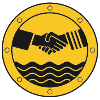
Built around a large natural harbour accessed through an entrance channel, the Port of Durban has 57 berths around 21 km of waterfront. Established as a port in 1840, by 2018 volumes of cargo have increased to a seven-year high, reaching 2.96 million TEUs, as well as 487,000 vehicles, 11.9 million tonnes of dry bulk and 28.6 million tonnes of liquids. In 2018 the port handled 3,061 vessels.
The city is built around the harbour, and the central business district is close to the berths. The port handles a huge variety of cargo including roro, sugar, containers, and can also deal with ship repair and bunkering. Traffic on the roads around the port is challenging at times, with journeys needed not only to visit ships, but also to transport seafarers to the town, to the seafarers’ centre or immigration clearance for those that want to leave the port.
Seafarers and fishers visiting the Port of Durban are currently cared for by a dedicated team of chaplains and by the ecumenical Durban Seafarers Mission, which has a building open to seafarers every day. The welcoming centre is jointly operated with the Apostleship of the Sea, Biblia, Christian Seaman’s Organisation, German Seamen’s Mission, Sailors Society and Mission to Seafarers. The centre is in beautiful grounds next to the harbour, and it has great facilities including a new bar and free wifi. Transport is provided for seafarers to access the centre. The chaplaincy team care for seafarers through an active ship visiting programme as well as when in hospital, in times of need and through being present at the centre. The newly formed Durban Port Welfare Committee seeks to supplement and build on the excellent service already provided in the port by the voluntary organisations and will establish a forum where the work of all maritime organisations with a vested interest in seafarers’ welfare can be coordinated.
The newly formed PWC brings together key representatives from the port, maritime community, the local and provincial government and non-profit organisations to support and improve seafarers’ welfare facilities and services. “Although we already have much work being done for the welfare of seafarers in the port of Durban, this initiative offers us a unique opportunity to formalise relationships and to establish a collaborative platform to better serve the needs of the 60,000 or so seafarers who visit our port each year” said Mr Peter Cottrell, Chair of the Durban Seafarers Mission.
A high-profile launch event was held in Durban on Wednesday 29 May 2019, which included a presentation from the IPWP and addresses by Captain Dennis Mqadi, Transnet Executive Manager for SHE and Regulatory Oversight, and Deputy Mayor Councillor Fawzia Peer who stated in her opening address “As a caring city, eThekwini recognises the important mission of the newly formed Welfare Committee, and gives the committee its full backing.” The event was extremely well supported by members of the maritime and local community, church leaders and key players in local and provincial government. As part of the Programme, representatives from the IPWP team provided Ambassador Training for representatives from ports within South Africa, Namibia and Tanzania who had expressed interest in starting up PWCs within their own regions.
The Durban PWC promises to be of great value to the port, the maritime industry and the country, and will complement the Comprehensive Maritime Transport Policy of South Africa.